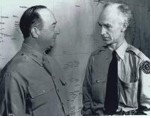
(See related pages)
But there are many of the living who have had burned into their brains forever the unnatural sight of cold dead men scattered over the hillsides and in the ditches along the high rows of hedge throughout the world. Dead men by mass production—in one country after another—month after month and year after year. Dead men in winter and dead men in summer. Dead men in such familiar promiscuity that they become monotonous. Dead men in such monstrous infinity that you come almost to hate them. These are the things that you at home need not even try to understand. To you at home they are columns of figures, or he is a near one who went away and just didn't come back. You didn't see him lying so grotesque and pasty beside the gravel road in France. We saw him by the multiple thousands. That's the difference... (Reprinted with permission of Scripps Howard Foundation) |
